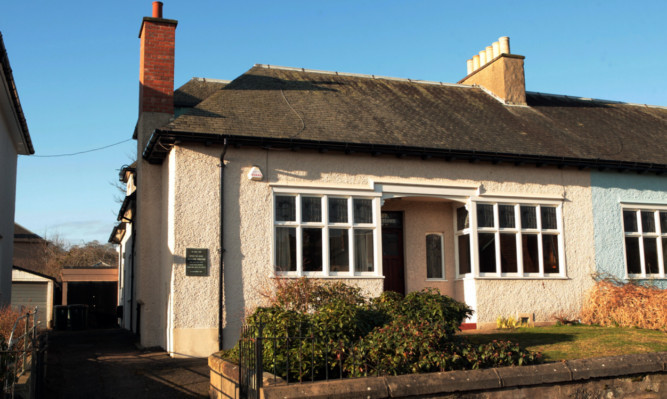The former Perth home of one of Scotland’s greatest poets could be brought into new use.
William Soutar House on Wilson Street is one of the Fair City’s most important cultural landmarks and serves as a memorial to its occupant of nearly two decades.
As he stayed there in the early 20th century, crippled by a horrific illness, he wrote some of his most important poetry and diaries.
The building was gifted to Perth Town Council in 1958 and was supposed to house prominent public officials. However, it suffered devastating flood damage after pipes burst and wrecked the ground floor in 2010.
Repairs were finally finished last year but the building has remained in only sporadic use. Wednesday’s meeting of Perth Common Good Fund is to consider a report suggesting the house’s future should now be settled.
It states: “The Soutar House is an important cultural asset for the city of Perth.
“However, it is recognised that there is a need to review the current use and identify future use of the property, with a view to identifying longer-term solutions which support the future vision for the city and agreed corporate priorities.”
Soutar was already a writer of renown when he moved into the Wilson Street property, designed by his father John Soutar.
He had been diagnosed with debilitating ankylosing spondylitis, a disorder which affected his movement and eventually saw him permanently confined to bed in 1930 in a specially extended lower floor room.
He remained there, writing and entertaining visitors while propped up in bed in a jacket and bow tie, until his death aged 45 of tuberculosis in October 1943.
The house was given to Perth Town Council by John Soutar, with a stringent list of conditions attached to keep his son’s memory alive.
He decreed the council should retain the property “in all time coming” and the plaque on the front should remain in place.
The ground floor room in which William Soutar spent the last 14 years of his life was to be made available at reasonable times to be viewed by visitors and the portrait of the writer should remain hanging where he left it.
He also said the house should be occupied by a council official or suitable tenant.
Contravention of any of the conditions would see the house revert back to the family beneficiaries of the trust.
The house was used by the council’s chief librarian and other holding similar posts and since the 1980s was the working base for the area’s writers in residence until that post was abolished in 2010.
The Friends of William Soutar Society formed to promote his work and Scots Language Centre have both since used the building.
The abolition of the feudal system has rendered John Soutar’s demands unenforceable but it is hoped the future use will incorporate the spirit of the initial gift.
